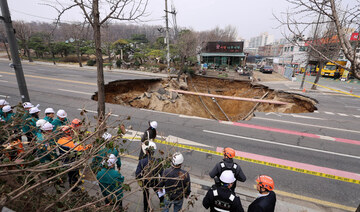DENPASAR: Several international airlines canceled flights to and from Indonesia’s tourist island of Bali on Wednesday as an ongoing volcanic eruption left travelers stranded at airports.
Tourists told The Associated Press that they have been stuck at Bali’s airport since Tuesday after their flights were suddenly canceled.
“The airline did not provide accommodation, leaving us stranded at this airport,” said Charlie Austin from Perth, Australia, who was on vacation in Bali with his family.
Another Australian tourist, Issabella Butler, opted to find another airline that could fly her home.
“The important thing is that we have to be able to get out of here,” she said.
Media reports said that thousands of people were stranded at airports in Indonesia and Australia, but an exact number wasn’t given.
Indonesia’s Mount Lewotobi Laki Laki volcano on the remote island of Flores in East Nusa Tenggara province spewed towering columns of hot ash high into the air since its initial huge eruption on Nov. 4 killed nine people and injured dozens of others.
The 1,584-meter (5,197-foot) volcano shot up ash at least 17 times on Tuesday, with the largest column recorded at 9 kilometers (5½ miles) high, the Center for Volcanology and Geological Disaster Mitigation said in a statement.
Authorities on Tuesday expanded the danger zone as the volcano erupted again to 9 kilometers (5½ miles) as volcanic materials, including smoldering rocks, lava, and hot, thumb-size fragments of gravel and ash, were thrown up to 8 kilometers (5 miles) from the crater on Friday.
The activity at the volcano has disturbed flights at Bali’s I Gusti Ngurah Rai international airport since the eruption started, airport general manager Ahmad Syaugi Shahab said. Over the past three days, 46 flights, including 30 scheduled to depart and 16 due to arrive, were affected.
Shahab said that at least 12 domestic flights and 22 overseas one were canceled on Tuesday alone. For these cancelations, the airlines were offering travelers a refund, or to reschedule or reroute, he said.
Three Australian airlines have also canceled or delayed a number of flights. Jetstar has paused its flights to Bali until at least Thursday, it said on its website, saying it was “currently not safe” to operate the route.
Virgin Australia’s website showed 10 services to and from Bali were canceled on Wednesday. Qantas said it has delayed three flights. Some airlines are offering fare refunds for upcoming Bali flights to passengers who don’t want to travel.
Air New Zealand canceled a flight to Denpasar scheduled for Wednesday and a return service to Auckland due to depart Bali on Thursday. Passengers would be rebooked and the airline would continue to monitor the movement of ash in the coming days, Chief Operating Officer Alex Marren said.
Korean Air said two of its flights headed to Bali were forced to turn back because of volcanic ash caused by the eruption.
The airline said Wednesday that the two flights — carrying about 400 passengers combined — that departed South Korea’s Incheon international airport on Tuesday turned back toward the origin departure a few hours later, following forecasts that said Bali’s Ngurah Rai airport could be affected by the volcanic ash. The two planes arrived in Incheon early Wednesday.
About 6,500 people were evacuated in January after Mount Lewotobi Laki Laki began erupting, spewing thick clouds and forcing the government to close the island’s Fransiskus Xaverius Seda Airport. No casualties or major damage were reported, but the airport has remained closed because of seismic activity.
<iframe width="560" height="315" src="https://www.arabnews.pk/%3Ca%20href%3D"https://www.youtube.com/embed/ixBFHleI2V4?si=oIA0DOifjfCHDwy5">https://www.youtube.com/embed/ixBFHleI2V4?si=oIA0DOifjfCHDwy5" title="YouTube video player" frameborder="0" allow="accelerometer; autoplay; clipboard-write; encrypted-media; gyroscope; picture-in-picture; web-share" referrerpolicy="strict-origin-when-cross-origin" allowfullscreen></iframe>Three other airports in neighboring districts of Ende, Larantuka and Bajawa have been closed since Monday after Indonesia’s Air Navigation issued a safety warning because of volcanic ash.
Lewotobi Laki Laki is one of a pair of stratovolcanoes in the East Flores district of East Nusa Tenggara province, known locally as the husband-and-wife mountains. “Laki laki” means man, while its mate is Lewotobi Perempuan, or woman. It’s one of the 120 active volcanoes in Indonesia, an archipelago of 280 million people.
The country is prone to earthquakes, landslides and volcanic activity because it sits along the “Ring of Fire,” a horseshoe-shaped series of seismic fault lines around the Pacific Ocean.
























